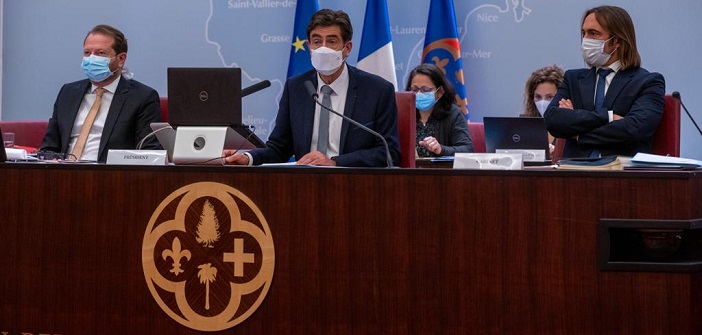This penultimate Departmental Assembly under the mandate of Charles Ange Ginésy was an opportunity to review the 2020 budget report, described as one of “rupture.” The least that can be said is that the results are hard to digest.
The past year was probably one of the most complicated the Alpes-Maritimes Departmental Council had to manage since 2007 (Subprime crisis). Following the outbreak of the Covid-19 pandemic in the country, which significantly impacted the department, the deadly and destructive storm Alex followed. President Ginésy recalled the financial impact:
- An estimated 1 billion € for this project
- 381 million € will be devoted to the reconstruction of the Valleys, including 280 million € for the renovation and creation of the road network.
- 75 million € have already been committed since October
- 5 million € will be disbursed monthly over several years in this renovation effort
- 10 million € in aid voted for the affected municipalities
- 2.5 million € intended for farmers
“The wounds are far from healed. But now, we can say that the recovery phase has begun,” he added, once again praising the work, solidarity, and mobilization of the people of the Riviera in the face of the catastrophe.
Lack of State Support
The Coronavirus also heavily impacted finances, with 32.8 million € in unforeseen expenses, to which the increased number of RSA (social benefit) recipients by 21.6% (amounting to an additional cost of 16.9 million €) can be added. Additional costs include the changes in rules to balance resource disparities among local authorities, requested by the 2020 finance law, leading to an increase in the department’s contribution by an additional 32.5 million € compared to 2019. All in all, the department’s debt now amounts to 828 million €. A figure that, although lower than in 2010, places the Alpes-Maritimes back in a difficult situation.
“However, I will not unnecessarily attack the government. No one found a tailor-made solution. Like many others, I have only two criticisms for the executive: insufficient anticipation. The Government was continually forced to act under pressure, trailing behind the virus’s progression. For masks, tests, vaccination, France failed in its responsiveness. Its strategy also lacked clarity, dancing back and forth without assurance or a guiding thread. The State lacked agility,” emphasized Charles Ange Ginésy, denouncing “a sclerotic, bureaucratic State that has become clumsy over time.”
A discourse supported by the president of the finance commission, Eric Ciotti: “I regret the State’s decisions that delayed the end of the crisis. The choices made by the President of the Republic last January 29 are tragic! They unfortunately led us to remain in this crisis, contrary to Great Britain. But I hope we emerge from it quickly, because our citizens cannot endure it any longer.”
The Opposition Regrets the Reduction of Property Tax
This was one of the pillars of the good management strategy advocated since 2009 in the council chamber. The stabilization of the tax and reduction of taxation, which was the subject of lengthy discussions between the majority and opposition, is back at the forefront in these challenging times. “You have reduced the property tax for two consecutive years, and this represented a loss that we estimated at 42 million €, not counting the impact this reduction had on the automatic increase of the equalization fund. To give an idea of what could have been done with this money, let’s say that it is approximately the amount of Covid-related expenses or equal to the reduction in DMTO (Duties on the Transfer of Property for Valuable Consideration). All this to say that we could have achieved a better budget balance if we had not deprived ourselves of these revenues for two years. But we cannot rewrite history, it’s done, it’s a choice we disapproved of, I wanted to say that here again,” justified Marie Louise Gourdon (PS) a few weeks before the elections for the departmental presidency. On this note, Jean Raymond Vinciguerra announced that this was his last participation in a Departmental Assembly, having served since March 2011.
On the side of the French Communist Party (PCF), the sentiment regarding fiscal orientations remains the same. They also propose, as they did at the end of last year, the creation of a mixed union for La Roya with the goal “to imagine, build, and ensure the management of innovative projects that will necessarily be involved in the reconstruction and refoundation of this valley,” explained Francis Tujague.
In any case, in 2021, the projects will still be heavy and varied for the next elected person who will have the decision-making responsibility in the Alpes-Maritimes department. Before discussing that, there will be one more Assembly next month.


